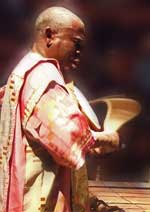With this being Thanksgiving weekend here in the US, I got to thinking about harvest festivals in general. I rarely see harvest celebrations in RPGs and yet in real life, they’ve been an important part of life throughout at least a large part of human history. Harvest festivals bring families and communities together; surely our fantasy worlds would also have similar rituals and festivals?
For the rest of the month, I’m going to detail various harvest festivals from around the world that you can use as inspiration for your own games.
(Photo courtesy of http://www.flickr.com/photos/kkendall/ / CC BY 2.0)
 Homowo or “Hoot at Hunger”
Homowo or “Hoot at Hunger”
This is a festival celebrated by the African Ga people, marking their migration to Ghana. According to tradition, the Ga people suffered a severe famine; Homowo celebrates the bountiful harvest they achieved after reaching their new homeland. Essentially, Homowo consists of sharing a meal with the living and dead members of the family in celebration of the harvest. It also marks the beginning of the Ga year.
The festival draws family members from far and near back to their ancestral towns. Normal daily business is suspended and the festival is considered a time of social harmony where debt payments may not be demanded, nor can oaths be taken or legal proceedings begun. It’s believed that ancestral spirits will cause the death of anyone who breaks these traditions. In a fantasy setting, this could be literally true.
Homowo Eve
On the eve of Homowo, men bring their father-in-laws bottles of gin and women bring their mother-in-laws firewood for cooking the next day’s feast. The senior women of a family smear the window sills of their home with ochre to protect themselves from any evil spirits that might enter the town during the night. A fantasy version of this could have the ochre blessed with a Protection from Evil or similar spell.
Modernly, guns are fired to warn people to stay inside their homes as the ancestral spirits enter the town on this night, but you could have the local clerics use bells, horns, or other noisemakers for the same purpose. Late that night, the Ga king sacrifices a sheep and shares it with senior members of the Ga government.
Homowo Day
Early Homowo morning, women of the household prepare a feast for the family. The male heads of household pour libations and a portion of the feast food on the graves of their ancestral spirits. Then the family gathers and eats together, ignoring the usual social hierarchy were senior members of the house eat before junior members and men eat before women.
After the feast, the community celebrates with a dance during which social norms are suspended. Anyone may dance and people may wear the clothes of the opposite sex, sing songs making fun of important people, and/or dress in tattered rags. Everyone can dance as equals. While the dance continues, all social constraints are thrown off.
Ngoo Wala — The Day of Remembrance
In Accra, this takes place the day after Homowo. Families gather to mourn their members who died during the last year. People go from house to house greeting friends and relatives, wishing them well in the upcoming year. This is a customary day to settle disputes and arrange marriages.
Three weeks later, Homowo closes with a children’s celebration that involves a legal looting of the local markets.
Sources
- African Harvest Festivals
- Homowo: Celebrating Community in Ga Culture
- Homowo Festival
- Homowo Festival in Ghana (little text, but has some photos)





